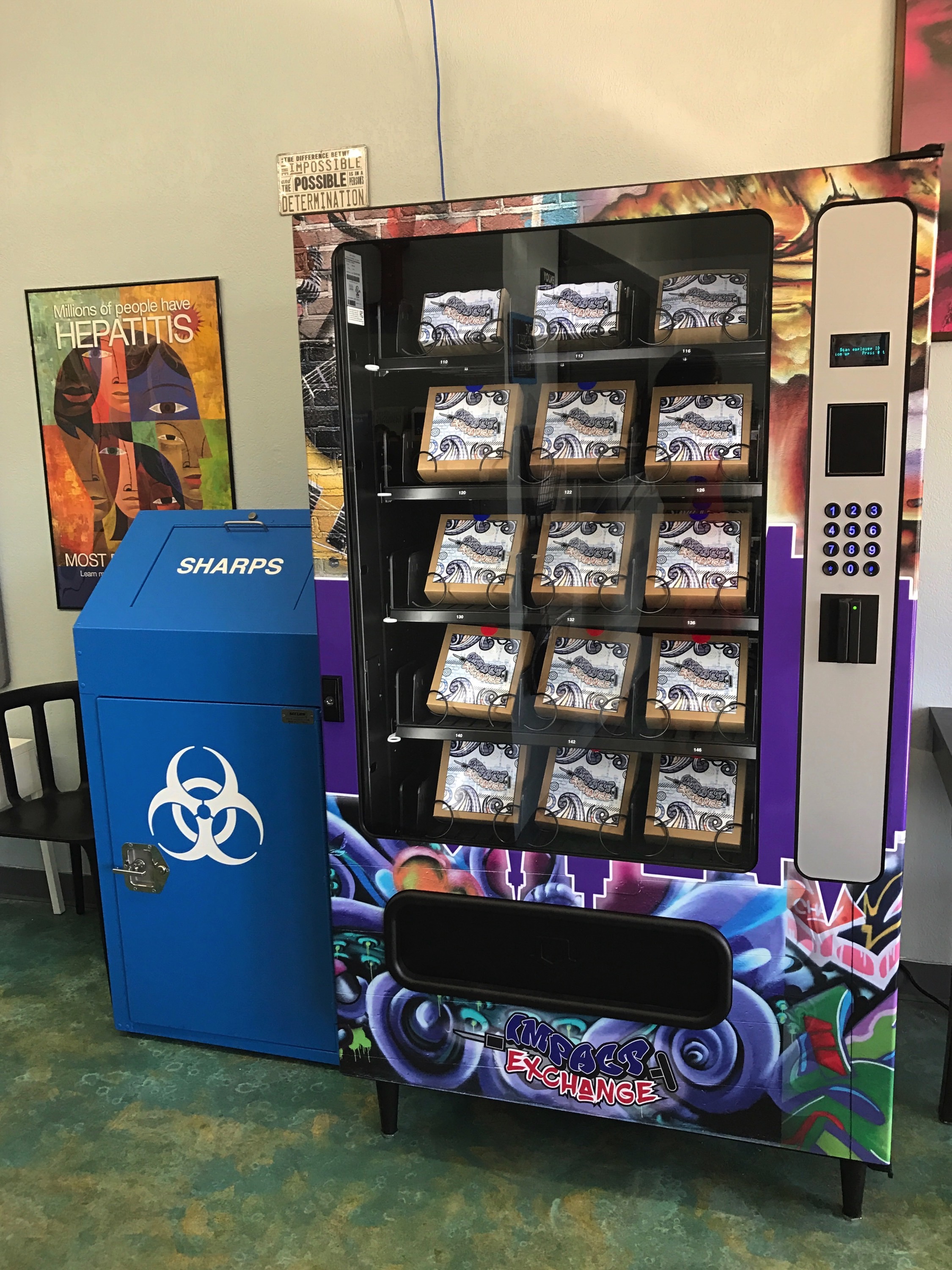A Different Kind of Needle Exchange in Las Vegas: Vending Machines

Las Vegas, Nevada.

Connecting state and local government leaders
This new project is different from all other harm-reduction programs in many ways except for the one that counts the most.
Intravenous drug users in Las Vegas will soon be able to access clean needles in much the same way someone might buy a soda or candy bar. Starting in May, a pilot program of three vending machines will be stocked with various materials aimed at stopping the spread of hepatitis, HIV and other blood-borne infections.
Las Vegas is the first place in the United States to have a program like this. The project is a joint effort by the Southern Nevada Health District, Trac-B Exchange—a brick-and-mortar needle exchange program—in collaboration with the Nevada AIDS Research and Education Society and the Harm Reduction Center LV.
These aren’t your typical vending machines—the machines being used in Las Vegas are actually pharmaceutical-grade devices more likely to be found dispensing controlled medication in a hospital than they are to be spotted in a gas station stocked with junk food. The machines are tamper-proof and wireless and will be able to provide real-time data to those monitoring the system—those responsible for the machines will be able to access information on the volume of use, and can even get an alert message when a machine is running low on inventory.

While these $15,000-a piece machines are incredibly high-tech, the system for accessing them is simple. The contents of the machines are totally free, but those who wish to access the kits will be required to register in-person at Trac-B or one of the other two participating organizations. At that point, an individual will be asked for some demographic information—a birth date and initials—in order to limit the number of kits any one person can receive in a given week. In return, they are given a swipe card and a personalized code to enter—the two possible ways to withdraw products from the machines.
Each of the packages will contain condoms, sterile syringes and needles and a small container for the used needles. And, in the near future, the team behind the vending machine project hopes to be able to include kits that contain materials for wound care, and maybe one day, Naloxone, the overdose-reversing drug.
A Decade in the Making
And, for that team, this pilot program has been a long time in the making—more than 10 years, in fact. The project was born of far-reaching conversations on the need for more innovative interventions between Marlo Tonge, the current manager of epidemiology and disease surveillance for the Southern Nevada Health District, and Rick Reich, the founder of Trac-B—who at the time of the initial brainstorming was managing of the office of HIV AIDS and STDs at SNHD.
“We have been having conversations about vending machines and normalizing these processes for a long time,” Tonge said in a recent interview with Route Fifty.
It’s a sentiment echoed by Reich: “Marlo and would sit around and we would be talking about this project or that project and then we’d go back to saying: ‘god it would be so nice to work on this vending machine project.’”
But what began as just conversation—a dream shared by colleagues—soon became a passion project for Tonge and Reich. Along the way, they conducted boots-on-the-ground studies of neighborhoods to get a better understanding of the problem. “We have areas in our community where you can go and you just see needles lying around,” Tonge said. The two took a trip to Los Angeles—on their own dime—to see a vending machine stocked with rapid HIV tests in action.
And they conducted an in-depth survey of nearly 500 drug users to better understand how a harm reduction strategy could suit their needs.
“Sometimes we create barriers, even when we think we’re doing the right thing,” said Tonge. “And if you don’t really connect with the population, if you don’t really ask what they need and you don’t deliver the product or intervention in the way that they need it, they won’t use it.”
Why Vending Machines
Overcoming unintentional barriers that prevent people from accessing harm reduction programs is a big part of why Tonge and Reich feel so strongly about the vending machine format of their project.
Reich concedes that a traditional storefront needle exchange like Trac-B, which he opened in February of this year, presents a few barriers for some of the people it’s trying to reach. Every time someone comes in for fresh needles, they need to be served by a staff member, and if demand is high on a given day, that person might have to wait to be seen. While those factors may seem minor, Reich knows they play a role in keeping some people away.
And more than just the logistical barriers, a vending machine helps screens out barriers related to prejudice that are often inevitable in a human interaction. Instead of having to talk to someone before getting access to clean needles—a conversation that, despite even the best intentions can be fraught with judgment—an individual can simply swipe a card and get what they need.
“These machines don’t have a personality. The machine isn’t biased,” said Reich. But, Tonge and Reich believe the point of the machines isn’t to help addicts avoid conversations about treatment and counseling alternatives, rather they are simply responding rationally to an unpleasant reality, that sharing needles is dangerous and should be prevented in every way possible.
Simply put by Reich: “If someone is willing to play safe, let’s make it a little bit easier for them.”
And there certainly is a demonstrated demand for harm reduction interventions. According to one rough estimate, which Tonge and Reich both agree is likely understated, there are as many as 5,800 active intravenous drug users in Clark County, where Las Vegas is located. Trac-B, the syringe exchange founded by Reich has been open for only three months so far. In the first month it was open, the storefront gave out 90 needles, in March, they gave out 500 and in the month of April, they’ve distributed just under 1,000.
Money Matters
Yet, by far the most compelling reason for the vending machines for both Reich and Tonge is the money. A vending machine cuts down on the operating costs of distributing needles. And in terms of the cost-effectiveness of harm reduction, in the case of needle exchange an ounce of prevention could be work a ton of cure.
Reich estimates the cost of providing a single kit containing 30 needles to be about $10. Assuming a person needs 20-30 needles per week, that means the vending machine project will spend about $520 a year on that person. If that person needs needles for a decade, it would cost $5,200, extrapolate out to 50 years of drug use, and you’ve spent $26,000. That might seem like a lot, but the cost for those five decades of clean needles seems like nothing in comparison to the treatment for hepatitis C that can come out to as much as $80,000 per person for 12 weeks of one pill per day.
“It really comes down to, do we just keep printing more money or do we really just try to be effective,” said Reich in terms of the clear cost benefit of harm reduction.
But, for all its innovation, in one key money-related way, the vending machine project is the same as many other harm reduction programs elsewhere in the country—it lacks a stable public funding mechanism.
The budget in Nevada does not have a line item that covers harm reduction—a problem in other places too. Route Fifty has covered the impacts of this issue in West Virginia in the past, and in that state, it’s meant that needle exchanges are restricted in their ability to expand.
The money to purchase the vending machines came from the budget of a defunct non-profit, and continued funding for the program comes from private donations and from Rick Reich’s personal retirement funds. In fact, Reich paid much of the costs for starting up the Trac-B storefront out of his own pocket.
Until a steady stream of money is found, Reich’s initiative will remain limited.
“Everyone has great intentions, but honestly money is the key,” Tonge said.
Quinn Libson is a Staff Correspondent for Government Executive’s Route Fifty and is based in Washington, D.C.

NEXT STORY: Under the Cover of Darkness, New Orleans Removes a Confederate Monument



